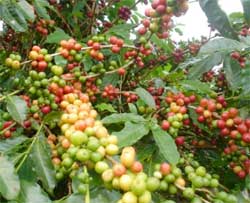Dry weather in Brazil drives up coffee price

The price of Arabica quality coffee, accounting for three quarters of Brazilian production, rose to 137.95 cents a pound in New York, the highest level since last May.
That represents a price rise of 23% in a week and of 36% since a seven-year low in November when the price was 100.95 cents.
The price of Robusta, considered to be a poorer quality than Arabica, rose to the highest level for six months at US$1,905 per ton in London.
The head of soft commodities research at Ecobank in London, Edward George, told AFP: "The price has been driven by one of the hottest and driest summers in living memory in Brazil, where some parts of the country have experienced the lowest rainfall since the 1940s."
George warned the weather would damage the growth of coffee beans, and also stunt the growth of trees ahead of next season's crop.
"Until there is a notable change in the weather, the price rally is set to continue," he said.
Coffee plantations damaged
The state of Minas Gerais, where most of the coffee plantations are located, has been particularly hard hit by the dry weather just as crops are at a critical point in their growth before the April harvest.
Economists at Commerzbank said: "The coffee market is in turmoil at the moment. There is no other way to describe the nearly twenty-percent surge in Arabica prices within five days of trading - including Tuesday's almost nine-percent gain, which was the highest for more than nine years."
It said the weather and price surge is giving rise to doubts about the previously envisaged scenario of extremely plentiful supplies, they warned, with doubts also being raised about the crop next year.
Many analysts had expected Brazil to have another record coffee harvest in the 2013/14 season after record production of 49.15m sacks last year which was a soft year in the two-year production cycle.
Price cycles
Consequently many traders had expected prices to fall, and the recent surge has forced them suddenly to change strategy.
The price of Arabica coffee fell by 36% in 2012 and by 24% in 2013 owing to an abundance of supplies.
High prices in 2011, reaching 307.20 cents per pound, encouraged producers around the world to plant extra trees and Brazil and Colombia invested heavily to raise output.
Some analysts said this year's price rise may not last. At Capital Economics, commodities economist Tom Pugh told AFP: "I would caution that the price spikes are mainly because of perceived fears of damage rather than any actual damage yet.
"If we were to get rains over Brazil in the next few weeks, the damage could actually be quite small and prices would fall just as sharply as they have risen. So the short-term outlook is very much dependent on weather patterns," Pugh said.
Source: AFP via I-Net Bridge